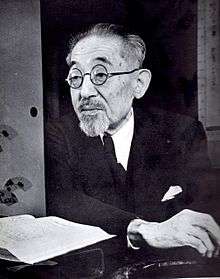Teiji Takagi
| Teiji Takagi | |
|---|---|
 | |
| Born |
April 21, 1875 Kazuya village near Gifu |
| Died |
February 28, 1960 (aged 84) Tokyo |
| Nationality | Japanese |
| Fields | Mathematics |
| Institutions | Tokyo Imperial University |
| Alma mater | Tokyo Imperial University |
| Doctoral advisor | David Hilbert |
| Doctoral students |
Shokichi Iyanaga Sigekatu Kuroda Kenjiro Shoda Hiroshi Uehara |
| Known for | Takagi curve, Takagi existence theorem |
Teiji Takagi (高木 貞治 Takagi Teiji, April 21, 1875 – February 28, 1960) was a Japanese mathematician, best known for proving the Takagi existence theorem in class field theory. The Blancmange curve, the graph of a nowhere-differentiable but uniformly continuous function, is also called the Takagi curve after his work on it.
He was born in the rural area of the Gifu Prefecture, Japan. He began learning mathematics in middle school, reading texts in English since none were available in Japanese. After attending a high school for gifted students, he went on to the University of Tokyo, at that time the only university in Japan. There he learned mathematics from such European classic texts as Salmon's Algebra and Weber's Lehrbuch der Algebra. Aided by Hilbert, he then studied at Göttingen. Aside from his work in algebraic number theory he wrote a great number of Japanese textbooks on mathematics and geometry.
He was also instrumental during World War II in the development of Japanese encryption systems; see Purple.
Bibliography
- Takagi, Teiji (2014) [1990], Iyanaga, Shokichi, ed., Collected papers, Springer Collected Works in Mathematics (2 ed.), Springer-Verlag, ISBN 978-4431549949, MR 1129240
External links
![]() Media related to Teiji Takagi at Wikimedia Commons
Media related to Teiji Takagi at Wikimedia Commons
- O'Connor, John J.; Robertson, Edmund F., "Teiji Takagi", MacTutor History of Mathematics archive, University of St Andrews.
- Teiji Takagi at the Mathematics Genealogy Project
- Takagi Lectures by the Mathematical Society of Japan